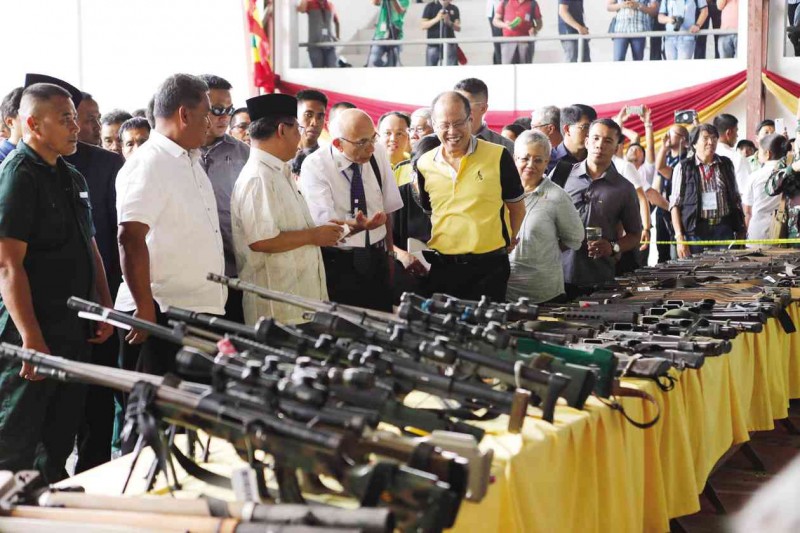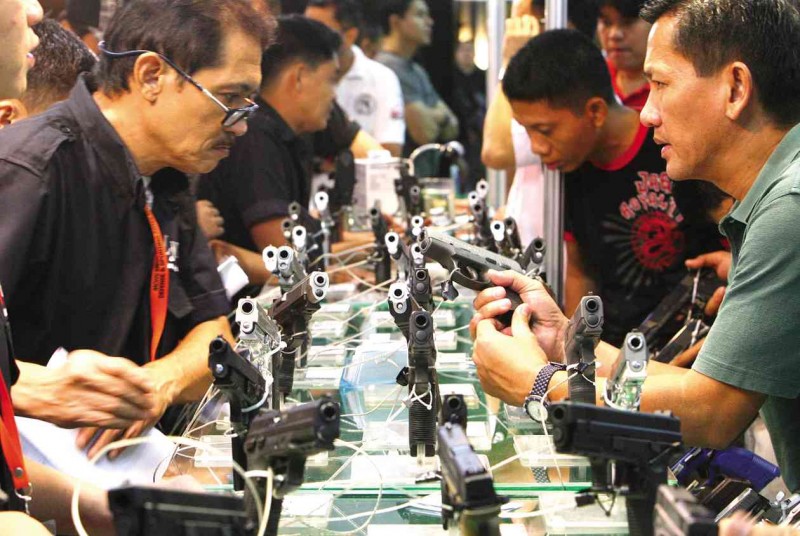Decommissioning amid loose guns

DEACTIVATED President Aquino and Murad Ebrahim, Moro Islamic Liberation Front (MILF) chair, look at
the firearms decommissioned by the group at the old provincial capitol in Sultan Kudarat town
in Maguindanao. The decommissioning of arms and combatants covered 55 high-powered and 20 crew-served weapons and 145 members of the MILF’s Bangsamoro Islamic Armed Forces.
JEOFFREY MAITEM / INQUIRER MINDANAO
PRESIDENT Aquino’s final State of the Nation Address (Sona) drew strong applause for his call to support the proposed Bangsamoro Basic Law (BBL) and the cause of an enduring peace in Mindanao. The President’s speech was a mix of nostalgia and reality. He spoke of the long struggle for peace and instability across the country, especially Mindanao, and his resolve to end political impunity and corruption.
His remarks were interspersed with evidence on the more than 160,000 criminals arrested by the police, the high-value communist and terrorist targets neutralized, and the more than 29,000 unlicensed weapons seized by law enforcers.
Arming or disarming?
It seemed strange though that on the last point, Mr. Aquino avoided responsibility for the new gun law that was passed under his watch. Republic Act No. 10591, or the Comprehensive Firearms and Ammunition Regulation Act of 2013, enables gun owners to register and carry outdoors up to 15 weapons of various types.
The omission is a glaring one, given the parallel implementation of a decommissioning initiative in the Comprehensive Agreement on the Bangsamoro (CAB) that ostensibly works at cross-purposes.
READ: ‘This is not surrender,’ says MILF chief on arms decommissioning
Simply put, RA 10591 widens the scope and ability to bear arms, while the BBL that will institutionalize the CAB is supposed to ensure the decommissioning of combatants and their weapons, or a simultaneous arming and disarming process. The incoherence and inconsistency, coupled with the rise in ethnic hatred following the Mamasapano tragedy, suggest the very real threat of a spike in gun-related ethnic violence.
Unregistered arms
The conflict in Muslim Mindanao is centuries-old and has claimed thousands of lives. Many years of contentious peace negotiations have finally produced a comprehensive agreement and a proposed law that will institutionalize the political settlement between the Philippine government and the Moro Islamic Liberation Front (MILF).
Among the many inducements to seal the final agreement is the oft-repeated promise offered by the BBL’s sponsors—the decommissioning of MILF weapons.
We now know, however, that the decommissioning will likely cover only crew-served weapons in the hands of the MILF and that most of the small arms and light weapons possessed by combatants will likely remain in their hands or within reach during the forthcoming election campaign, the transition period and the creation of the new Bangsamoro government. Moreover, the process is undermined by the spread of unregistered firearms in Muslim Mindanao.
The international firearms trade provides a glimpse of the extent of this problem. New data from the Norwegian Initiative on Small Arms Transfers on small arms trade between the Philippines and the United States indicate that local importers and customs officers underdeclared firearms imports from the United States by $2.36 million in 2013. (See table for breakdown of data.)
The data cover only the deliveries of small arms from the United States. It is possible that local importers also underdeclared imports of small arms and other types of firearms from other countries and that some of these weapons have found their way into the gray market. International Alert’s 2013 study on the illicit gun trade in Mindanao points out that undeclared gun imports find their way to the illicit gun trade (Quitoriano 2013).
Access to more weapons
Under RA 10591, a citizen can own up to 15 registered firearms under a Type 4 license. It also allows a “certified gun collector” to own more than 15 registered guns under a Type 5 license but does not provide a definition for “gun collector.” If the certification for being a gun collector is also relatively easy to attain, then one person can choose to own more than 15 firearms under RA 10591.
Although these guns are subject to inspection and apply only to registered small arms or light weapons (RA 10591 allows citizens to register small arms or light weapons), the law threatens the efficiency of the MILF weapons decommissioning process by allowing private gun ownership of more than 15 firearms.
Thus, an MILF combatant may refuse to give up his firearms, citing the many guns in the hands of civilians. Or, because the decommissioning process does not cover small arms and light weapons, he can reason that his firearms are for private use and then register them.
Conflict specialists have recognized the importance and effectiveness of measures that bind the process of disarmament or decommissioning with the evolution of trust and confidence between both parties. In practical terms, it is difficult to leave former combatants vulnerable when returning to their communities where everyone else is armed. It is likewise unlawful to deny any legally qualified Filipino, including the soon-to-be-retired MILF combatant, the right to bear arms enshrined in RA 10591.
Ethnic tensions
One must note that the difficult transition process from the Autonomous Region in Muslim Mindanao to the Bangsamoro is occurring amid tensions between Moros, indigenous peoples and Filipinos with deeply entrenched prejudices against Moros. These tensions could ignite violent conflicts as the transition process continues and interests begin to clash. Imagine the bloodshed that can result given the many weapons that are available for use.
RA 10591 allows citizens to use firearms as long as this is for self-defense (Article 1, Section 2). The wording of this clause is quite similar to the US Second Amendment, which states that “[a] well-regulated militia, being necessary to the security of a free state, the right of the people to keep and bear arms, shall not be infringed.” Both protect a citizen’s right to ownership and use of guns for self-defense.
However, RA 10591 requires citizens to prove their life is in danger to be able to get a permit that allows them to carry their weapons outside of their homes. But what constitutes as proof that a person’s sense of security has been threatened is not specified and seems entirely subject to the opinions of those who issue the permit, in this case, the police.
Negative stereotypes
Threats to one’s personal security can be based on negative stereotypes of a specific ethnic or racial group as being overly aggressive or confrontational. When people begin to violently attack others based on the widespread acceptance of stereotypes, systematic racial or ethnic violence ensues.
In the case of the United States, racial stereotypes of blacks have led to mass shooting incidents targeting them on the basis of self-protection.
A recent racially motivated shooting incident in Charleston, South Carolina, proves that racial stereotypes in combination with loose gun control laws enable racial violence. The shooter, Dylann Roof, killed nine black parishioners in Emanuel African Methodist Episcopal Church, which is famous for its role in America’s civil rights movement in the 1960s. Roof shot nine innocent black parishioners to death because he believed that blacks were systematically raping white women and “taking over” America.
While Roof could be regarded as an extremist, his violent actions were enabled by loose gun control laws, which gave him access to the weapon he needed to execute his plans.
As a result of the Charleston shooting and the Black Lives Matter movement, Americans are beginning to discuss gun control once again. Some claim that gun control will stop violent attacks against blacks in the United States because extremists will be prevented from doing hate crimes. However, it is important to acknowledge that gun control alone surely won’t reduce racism against blacks.
Nevertheless, loose gun control laws should not continue to enable mass shooting incidents specifically targeting blacks. When racial stereotypes are combined with easy access to guns, racial violence against blacks can persist.

GUN SHOW Various pistols are displayed at the Defense and Sporting Arms Show at a mall in Mandaluyong City. MARIANNE BERMUDEZ
Gun crimes
The existence of ethnic divisions and stereotypes in the Philippines provides similar possibilities. Many Filipinos possess stereotypical images of Moros as overly aggressive and prone to violent confrontations against other groups since colonial times.
Anti-Moro sentiments have been increasing since the Mamasapano incident in January. Tensions between Moros and non-Moros within Muslim Mindanao have also heightened amid unclear provisions for indigenous peoples in the BBL. When the ownership and spread of illicit guns coexist with these ethnic cleavages, the potential for violent conflict highly increases.
The Rwandan genocide is emblematic of this phenomenon. In 1993, machetes worth $725,999 were imported into Rwanda (Melvern 2004). Import licenses were issued to acquire the machetes, many of which came from China.
Soon after, the Rwandan genocide occurred. Tutsis were systematically targeted and murdered by the Hutu majority. Machetes were the most common weapons used during the genocide. Systematic ethnic violence was certainly enabled by the increased access to imported machetes.
Do we care enough?
The Philippines and the United States are different places with different laws, people and contexts. However, we cannot deny that the Philippines continues to be influenced by the United States, as evidenced by the US-Philippines gun trade and the similar rationale of RA 10591 and the Second Amendment.
If America’s right to bear arms clause has led to racial violence targeting blacks, it is possible that the Philippines’ RA 10591 may also lead to similar outcomes against Moros.
In the United States, President Barack Obama has constantly railed against the loose gun laws that enable mass shootings arising from identity and racial hatreds. Obama can cite the powerful lobby and tactics of the National Rifle Association to explain his continued failure to undertake stronger gun controls.
Mr. Aquino cannot cite the same excuse, as local gun clubs and associations do not have the same clout. Besides, the President has yet to announce a distinct policy position on the problem of loose weapons.
No clear priority
The Sona underscored the absence of any clear priority and policy to stem the spread of illicit weapons. The government does not seem to recognize the implications of the illicit gun trade on decommissioning and the ethnic violence that can be triggered.
It is important for the State to consider imposing strict gun control laws, as the decommissioning of the MILF weapons will not reduce the sort of violence that emerges from widespread public access to illicit weapons.
The right to bear arms is based on maintaining people’s sense of security. But when one uses that right to threaten the security of others, the protection of the general public’s security should be prioritized over that right.
(Josephine Ong is a research fellow of the Philippines Program of International Alert UK. Her research interests include conflict, development and international environmental economics.)















